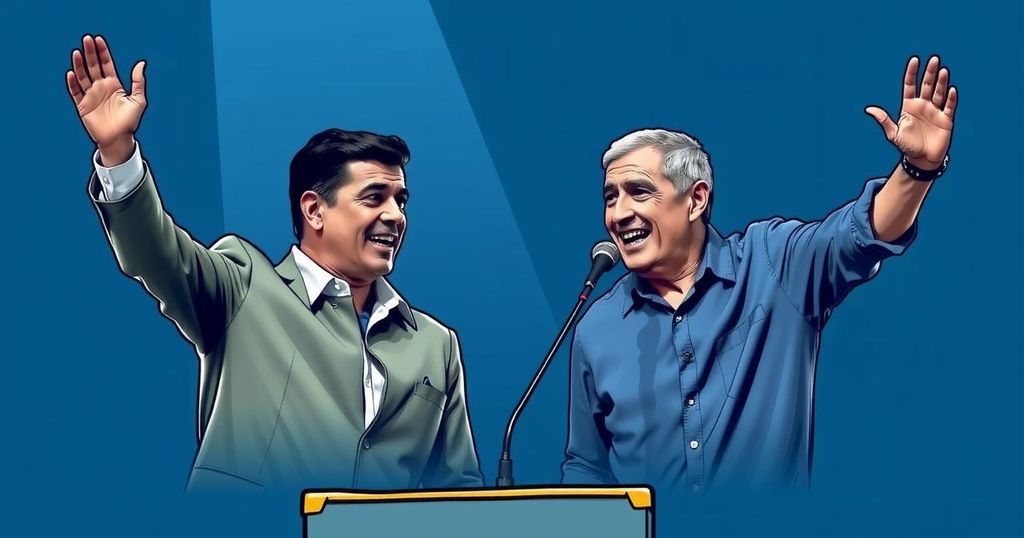Uruguay’s presidential runoff features Álvaro Delgado from the National Party and Yamandú Orsi from the Broad Front in a tightly contested race, following a divided result in the previous election round. With significant concerns regarding crime and economic stability, both candidates are appealing to voters while reflecting a commitment to democratic integrity amid prevailing indifference towards traditional political tensions.
Uruguay is currently undergoing a pivotal moment in its political landscape as voters engage in a decisive second round of presidential elections. Following last month’s elections, neither the governing conservative National Party nor the leftist Broad Front coalition secured an outright majority. The two candidates, Álvaro Delgado of the National Party and Yamandú Orsi from the Broad Front, find themselves in a tightly contested runoff.
In the initial round of voting, the Broad Front garnered 44% of the votes, while Delgado’s party received 27%. Additionally, conservative allies within the governing coalition accounted for 20%, providing Delgado with a crucial advantage. Polling indicates a near tie between the two candidates, even as about 10% of voters remain undecided.
With campaigns lacking vigor, the election has failed to incite strong emotions among voters, contrasting with the populist movements observed in other regions. Analysts note that key topics such as social spending and income inequality do not evoke the same level of urgency in Uruguay as observed in the United States.
The candidates are addressing growing public concern regarding a noticeable increase in violent crime, traditionally a minimal issue in Uruguay. Delgado advocates for strict anti-crime measures while Orsi endorses community-focused crime prevention strategies.
Delgado, a prominent veterinarian and a seasoned member of the National Party, positions his campaign as an extension of the current administration’s policies, pledging to maintain economic momentum and continue existing trade negotiations, notably with China. In contrast, Orsi, a former educator and legacy of notable liberal President José Mujica, aims to establish a progressive left platform without proposing sweeping reforms.
As the October vote highlighted a divided Congress, it remains crucial for the winning candidate to form alliances to govern effectively. This election underscores Uruguay’s democratic resilience, reflected in a notable absence of chaos and divisiveness.
Mujica himself, a revered figure in Uruguayan politics, highlighted the need for negotiation amidst the evolving political landscape, emphasizing the importance of a stable democracy in the region. Amidst these dynamics, both candidates’ platforms reflect the necessity for responsive governance amid social and economic challenges.
In essence, the election represents a crucial juncture for Uruguay, balancing progressive social policies with economic pragmatism within a framework of democratic integrity.
The political landscape in Uruguay has shifted dramatically in recent years, particularly following the tenure of the leftist Broad Front which governed the country for 15 years until the election of center-right President Luis Lacalle Pou in 2019. Key social policies, including the legalization of abortion, same-sex marriage, and marijuana sales, defined this era and established the Broad Front as a progressive force in South America. The recent elections, however, have exposed the complexities of governance, with no party achieving a clear majority, leading to dynamic and competitive runoff elections that underscore the fluidity of public sentiment and the anchoring of democracy in the region.
The presidential runoff in Uruguay presents a compelling narrative of a divided electorate grappling with pressing social issues and economic concerns. With both candidates representing different political legacies and ideologies, the outcome will have significant implications for the nation’s governance and the future direction of its policies. The election not only highlights the competition between parties but also reflects the strength of democracy in Uruguay as it navigates challenges amidst evolving public expectations and socio-political contexts.
Original Source: www.voanews.com






